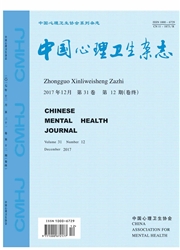

 中文摘要:
中文摘要:
目的:探讨Asperger综合征(Aspergersyndrome,AS)儿童的智力结构特点及其智力合成指数与其临床症状的相关关系。方法:采用国内修订韦氏儿童智力量表第4版(WechslerIntelligenceScaleforChildren—FourthEdition,WISC—IV)对27例符合美国精神障碍诊断与统计手册第4版的AS儿童和年龄、性别匹配的27名正常儿童进行测试,由AS儿童家长填写AS筛查量表以评估其临床症状。结果:AS组在总智商[(96.1±12.0)VS.(105.6±9.4)]、知觉推理指数[(100.44-13.6)VS.(108.9±11.2)]、工作记忆指数[(92.3±10.0)VS.(97.9±9.9)]、加工速度指数[(92.24-11.5)VS.(107.4±12.8)]、认知效率指数[(90.8±9.3)VS.(102.3±10.6)]均低于正常对照组(均P〈0.05)。分测验中AS组在积木[(9.7±3.4)VS.(12.3±2.6)]、背数[(7.9±1.9)VS.(9.0±1.9)]、译码[(8.2±2.2)VS.(11.3±3.0)]、符号检索[(9.2±2.6)VS.(11.6±2.5)]的得分低于对照组(P〈0.05)。AS的智力合成指数与其临床症状未发现具有相关关系(r=0.34~0.63,均P〉0.05)。结论:AS组智力水平在正常范围但低于正常对照组,AS儿童存在着一般认知能力高于认知效率的认知模式,AS儿童的智力合成指数与其临床症状的关系有待进一步研究。
 英文摘要:
英文摘要:
Objective: To analyze the intelligence structure characteristics in Asperger syndrome (AS) chil- dren and to explore the relation between intelligence composite index with clinic syndrome. Methods: Totally 54 children were selected, including 27 children who were diagnosed as AS according to the Diagnostic and Statistical Manual of Mental Disorders, Fouth Edition ( DSM- IV) criteria and 27 control children. The two groups children were assessed with the Wechsler Intelligence Scale for Children-Fourth Edition and in the AS group, the Asperger Syndrome Screening Scale was filled by the parents of AS children to assess their clinical symptoms. Results: The AS group scored lower in the full scale intelligence quotient [ (96. 1 ± 12. 0) vs. (105.6± 9.4), P 〈 0. 05], percep- tual reasoning index [ ( 100.4±13.6) vs. ( 108.9± 11.2), P 〈 0. 05], working memory index [ (92. 3 ± 10. 0) vs. (97.9 ± 9. 9), P 〈 0. 05], processing speed index [ (92. 2 ± 11.5) vs. ( 107.4± 12. 8), P 〈 0. 05] and cognitive pro- ficiency index [(90.8 ±9.3) vs. ( 102. 3 ±10. 6), P 〈0. 05]. Among the 10 core subsets, AS children scored lower than control children in block design [ (9. 7 ± 3.4) vs. ( 12. 3 ± 2. 6), P 〈 0. 05], digit span [ (7. 9 ± 1.9) vs. (9. 0 ± 1. 9), P 〈0. 05] , coding [(8.2±2.2) vs.(ll.3+3.0),P〈0,05] and symbol search [(9.2±2.6) vs.(11.6± 2.5), P 〈 0. 05]. There was no canonical correlation between intelligence composite indexes and the scores of clini- cal symptoms( r = 0. 34 -0. 63, Ps 〉 0. 05). Conclusion: Children with AS may have the normal general ability, but lower than the normal. AS children may display a cognitive profile that is general ability index is better than cogni- tive proficiency index. Further studies investigating the relationship between clinical symptoms and intelligence com- posite indexes are needed.
 关于金宇:
关于金宇:
 关于静进:
关于静进:
 同期刊论文项目
同期刊论文项目
 同项目期刊论文
同项目期刊论文
 期刊信息
期刊信息
